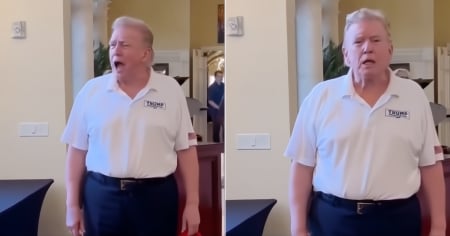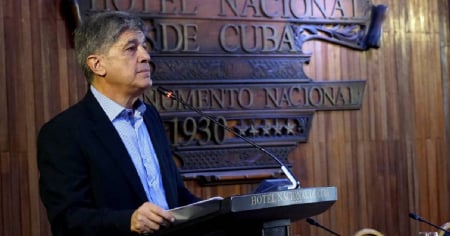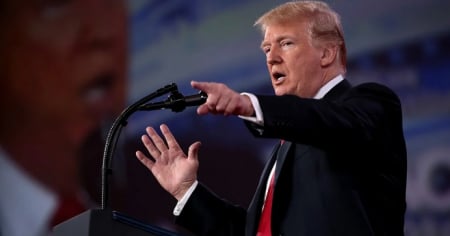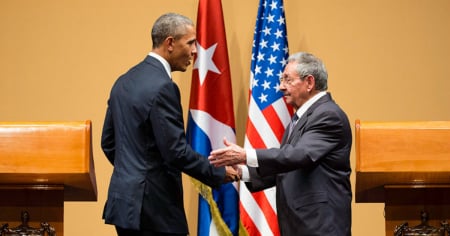The Cuban regime claims that it is seeking a "serious and respectful" relationship with Donald Trump, just a few days before he takes office as President of the United States.
Carlos Fernández de Cossío, the director general for the United States at the Ministry of Foreign Affairs (MINREX), expressed the government's willingness to engage in dialogue with the Trump administration, but emphasized that the sovereign interests of both nations must be respected.
"We will be attentive to the stance the new government adopts, but Cuba's willingness will remain the same as it has been over the past 64 years. We are ready to develop a relationship with the United States that is serious and respectful between both countries and, of course, protects the sovereign interests of both," he noted.
The deputy minister assured that Cuba will not halt the collaborations that already exist between the two countries.
"Cuba will not be the one to propose or take the initiative to suspend the existing dialogues or to halt the current cooperation. Not even the discreet exchanges on some sensitive issues," he specified.
His statements come as the 10th anniversary of the announcement of the rapprochement between Havana and Washington is observed, which led to the restoration of diplomatic relations in 2015. The process of thawing that was initiated by Raúl Castro and Barack Obama was halted by Trump, who imposed strict economic sanctions on Cuba.
This is the main concern of the regime with Donald Trump’s return to the White House on January 20, as a toughening of his policies towards Cuba could lead to dire consequences on the Island, which is on the brink of collapse.
According to Fernández de Cossío, it is concerning "the effect that increased hostility from the U.S. may have on our economy, and in particular, the impact it could have on the standard of living of the population, as it has proven to be very powerful and possesses a highly effective destructive capacity to cause harm."
However, the deputy minister clarified his own words by stating that "we will be able to survive" another four years of Trump. This aligns with the ruling Díaz-Canel, who recently said that the country is prepared for another Trump administration "with equanimity and without fear, but vigilant."
In the United States, many believe that the Díaz-Canel government will not withstand another four years of Trump.
Cuban-American Congressman Mario Díaz-Balart stated that Donald Trump will put an end to the "weak and shaky" dictatorships in Cuba, Venezuela, and Nicaragua.
"With four more years of Trump in the White House and the team he has assembled to execute foreign policy and national security, I am convinced that those regimes will face great difficulties in maintaining power," he emphasized.
Political analyst Juan Antonio Blanco, president of the organization Cuba Siglo 21, also believes that Trump could implement more restrictive measures against the regime upon taking office, aimed at suffocating the Island's economy and strengthening the internal opposition.
Among those supposed measures would be increasing trade and financial restrictions, further reducing visits from U.S. citizens to the Island, preventing money transfers from the United States, withdrawing permits and agreements for cooperation and business, and hindering the flow of fuel, among others.
Frequently Asked Questions about Cuba-U.S. Relations and the Impact of Trump
Why is the Cuban regime seeking a "serious and respectful" relationship with Trump?
The Cuban regime seeks to establish a "serious and respectful" relationship with Donald Trump to protect its sovereign interests and avoid a tightening of U.S. policies that could worsen the economic situation on the island. Cuba is interested in preserving existing collaborations and preventing the suspension of dialogues and cooperation.
How could a second term for Trump affect the Cuban economy?
A second term for Trump could escalate economic and diplomatic sanctions against Cuba, including restrictions on trade and remittances, as well as increased pressure on tourism. These measures could exacerbate the economic crisis in Cuba, which is already facing significant challenges.
What position has the Cuban government taken regarding the possibility of new sanctions from Trump?
The Cuban government, led by Miguel Díaz-Canel, has expressed its readiness to face a Trump administration with equanimity and vigilance. Cuba will not yield to attempts at interference and will promote development through creativity and innovation, without abandoning socialism.
What specific actions could Trump take against Cuba and its allies?
Trump could escalate sanctions, implement trade and financial restrictions, and increase pressure on countries that support the Cuban regime, such as Venezuela. A more stringent approach to national security and immigration policy is anticipated, which may include deportations of individuals linked to repressive regimes.
What is the internal perception in Cuba regarding Trump's return to power?
Within Cuba, there is concern about the negative impact that a second term for Trump could have on the economy and living conditions. The population fears a tightening of policies that could deepen the economic crisis, further affecting citizens.
Filed under:





